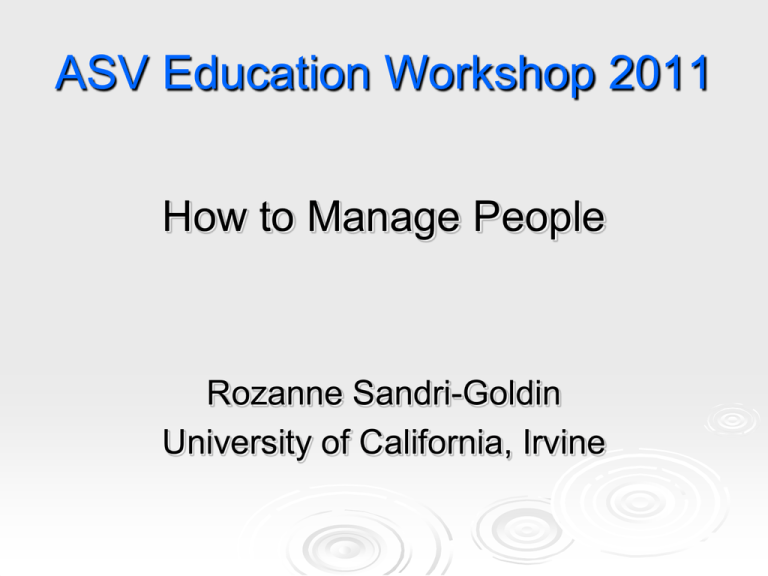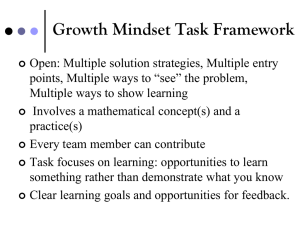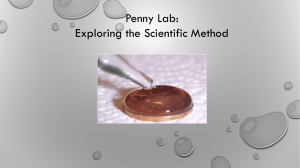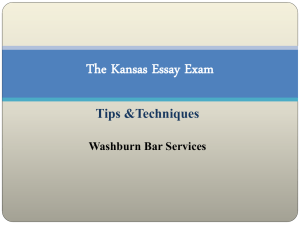2011_Slides-EduWorkshop-Sandri
advertisement

ASV Education Workshop 2011 How to Manage People Rozanne Sandri-Goldin University of California, Irvine PI Challenges- Managing People To be an effective leader of a research group, you must be an effective Personnel Manager As graduate students and postdoctoral fellows, we are trained to perform research but not how to direct our own research labs Tips that I have learned the hard way Selecting lab members including technicians, graduate students and postdoctoral fellows Managing and directing your research group and how to deal with problems that can arise What to do if you can’t fix the problem How do you choose laboratory personnel? The top characteristics to look for: a good work ethic and self motivation. If you constantly have to try to motivate someone, you will be both be frustrated. In today’s competitive funding environment, you can’t afford a slacker. Other characteristics are also important The lab is a social environment where your lab members will spend more time than they do at home. It’s important that lab members are sociable and get along and are interactive and cooperative. One disgruntled student can create an unfriendly working environment for everyone. What if you discover that you have an unmotivated lab member? You are a faculty member and you had have good reports on Jane, a graduate student who rotated through your lab. You were busy with grant applications during the rotation and did not observe Jane’s day to day work habits first hand. Your other graduate students rated her highly so you asked Jane to join the lab. However, lately you have noticed a pattern of Jane leaving experiments uncompleted, arriving late each day, and looking bored during lab meetings. This morning, when it was an hour past the time Jane was to meet with you to go over data, you asked other students about her whereabouts. They said they didn’t know and appeared to be very uneasy when asked. The next morning Jane arrives on time, but says nothing about the prior day. How do you address this issue with the student? Talk to the student directly Have a conversation with Jane and ask about her recent behavior—don’t put other students in the lab on the spot. It is not their responsibility to keep track of other students. Perhaps this is temporary situation. Jane might have a health problem or a family problem, etc. If there are no special circumstances, and Jane thinks that this is an acceptable level of commitment, clearly define what you expect of graduate students in your lab and explain the level of commitment that is required for succeeding in graduate school. Your interactions with lab members are paramount Set a good example If you want your students to have a good work ethic, you should also work hard If you expect students to meet deadlines, you should meet deadlines If you want effective communication between you and your lab members, encourage them to come to you with technical questions or problems by being available to meet with them outside of structured times such as lab meetings—try to have an open door policy Your interactions with lab members are paramount Develop good relationships with lab members Take an interest in your students lives outside the lab and have some conversations that are not research data driven Don’t become “friends” with lab members. You are the supervisor and director of your research program and if constructive criticism is needed at some point, you’ll be viewed as a traitor. Your interactions with lab members are paramount State your expectations up front as soon as someone joins the lab Clearly describe what you expect of students and postdocs in terms of commitment, hours worked etc. New graduate students may not know that experiments do not fit a 9 to 5 schedule and require evenings and weekends too Make it clear that graduate school or a postdoctoral fellowship is not a job; it’s a learning and training experience to prepare them for their careers Interactions among lab members Lab members should get along for a productive work environment There should be a team spirit of cooperation and collaboration If one member of the team is not a team player, this can lead to an unhappy and unproductive work environment What if a member of your lab is competitive rather than cooperative with other lab members? Example: Your lab does a lot of tissue culture and you only have one tissue culture hood. Your technician develops a sign-up system so that lab members must plan their experiments in advance and sign up for hood use. John planned an experiment that would address a concern raised by a reviewer on a manuscript that requires modification. He set up the cells for infections without signing up for the hood. The next morning, he got to the lab early before Mary who was signed up and started his experiment. When Mary got everything ready to start her time course experiment, she found John using the hood. His response was that this was a very important experiment that he needed to do and she would have to wait until he was finished. Mary responded that her time course would go late into the night as it was and delaying the start time would make it even later. She also said that her work was important too. Talk with John and use a solutionfocused approach Don’t just criticize John because criticism alone does not lead to solving problems Propose a solution, namely, that because of limited resources that restrict the lab to one hood, he will either have to cooperate and use the hood sign up list or request permission to use a tissue culture hood in another lab when the lab hood is booked. Both solutions require planning ahead on his part. Let him know that he must be willing to compromise and that he must accept responsibility for being a member of the lab group and thus, he must follow the rules of the group. What if problems develop with your group’s social interplay? Example: Claire is a new postdoctoral fellow in your lab. She has a strong CV and is very promising. Recently, you have been spending more time “on the road” and must leave your lab in the hands of others while you travel. There are two other postdoctoral fellows, one technician, and one graduate student in the lab, all from a similar cultural background. All speak English as a second language and communicate verbally with one another in a language that you and your new postdoctoral fellow don’t understand. Claire comes to tell you that she finds it difficult to interact with the others and feels it has begun to have an effect on her research. She needs the assistance of the technician, but feels there is a “communication gap.” She requests your presence in the lab full-time to provide close oversight of the technician. Talk to each lab member about this situation in private Don’t talk to the group because this can alienate the group against Claire, the new postdoc. Explain to each member that lab members must work as a team and that a team cannot perform well without effective communication. If a player cannot understand other team members, the whole team will perform badly. Explain that as the team coach, you must be able to communicate with all team members and therefore, while outside of the lab speaking in your native language is fine, but inside the lab, the official language is English. What if your lab becomes more social and less work oriented? Lab social interactions are important and lab social functions like a summer picnic or holiday party are good mixers But if one or more lab members begin to orient their experiments around social events, it’s time to intervene Experiments vs. Coffee breaks Example: James, a postdoctoral fellow has come to your lab to do a second postdoc after doing his graduate work and a first postdoc in his native country. He is older and has more experience than the graduate students in your lab. James begins to introduce new lab practices that he says are standard in labs at home. He comes in later than you and the rest of the lab and organizes daily lab lunches with your graduate students with leisurely discussions that generally take about 1 ½ hours. He also states that it is customary to have long coffee breaks in the afternoon and your students take these breaks too. James winds up his day around 5:30 and soon your students start leaving then too. You notice a steep drop off in lab productivity. Experiments vs. Coffee breaks First, talk to James privately in your office. Explain that you have noticed that his working schedule differs from what you expect of a postdoc. Let him know that you understand that there are differences in the lab culture in his home country and here, but you expect him to adapt to the new lab environment. Also explain that he is not only performing below expectations but he is setting an example that your students are following and lab productivity has suffered. Suggest some compromise that will help with the transition. For example, agree on a bi-weekly lab lunch at a new restaurant or a pot luck in the conference room that can be planned in advance so all lab members can schedule this lab event around their experiments. Schedule lab meetings for the late afternoon or evening and bring refreshments—coffee and cookies in the afternoon or beer and pizza at evening meetings. Resolving conflicts in the lab Sometimes conflicts will arise between lab members Don’t ignore these conflicts and hope they will go away Try to get to the bottom of the issue and find a resolution Lab conflicts Example: Cathy is a senior graduate student in your lab and Penny is a technician who has been in your lab for 6 months. Penny performs all the technical duties in the lab, but she does not have her own project. Cathy is frustrated because her work is going more slowly than she had hoped and she wants to finish her thesis research by the end of the year. She asks Penny to do some of her experiments because she says she needs the assistance. Penny responds that she is the lab technician and does what the PI tells her to do, not graduate students. Cathy becomes angry at this response and begins to talk to other lab members about Penny, stating that she could be doing a lot more work than she does. Cathy starts criticizing Penny openly in front of others if she finds a lab reagent that Penny is responsible for is not immediately available when Cathy wants it. Penny starts to snap back that the reagent has not been put on the lab board by Cathy. The lab atmosphere becomes strained and other students don’t want to take sides. Soon, no one is communicating when Cathy and Penny are in lab. Pete, a postdoc comes to tell you what has happened. How could this conflict have been averted? Cathy could have come to you to ask for Penny’s assistance with her experiments. You probably would have agreed to Penny working with Cathy for awhile if Penny was still able to do her own work. Now, Cathy is too angry with Penny to accept her help. Penny is too angry with Cathy to be willing to help. So what do you do now? First, talk to Cathy and Penny separately to hear both sides. After listening to Cathy, explain to her that you are Penny’s supervisor and she works for you but had Cathy come to you, you would have agreed that Penny could assist Cathy. Also tell Cathy you realize that she is frustrated with the slow pace of her work but her anger was misplaced. After listening to Penny, tell her she should have come to you with Cathy’s request. That Penny didn’t discuss it with you may mean that she didn’t really want to do Cathy’s work too. You want to resolve the conflict and restore an amiable working environment in your lab. What do you do? Propose a resolution that will require some compromise on both sides. Since neither Cathy nor Penny are likely to want to work together now, one solution would be to ask Pete to collaborate with Cathy on an aspect of her project and to do some of the experiments In turn, Penny can help Pete with his work so he doesn’t fall behind. Make it clear to Cathy and Penny that you expect them to resume a congenial and cordial relationship in the lab. What do you do if a graduate student is under performing? Susan has not been making progress on her project and her lab meeting presentations suggest she hasn’t been putting in much effort. In your weekly meetings with her, she always has an excuse for why an experiment has not been done or why it wasn’t completed. She forgets to do important controls and sometimes mixes up samples because she answered her cell phone and lost track of what was added to which tube. When you come to her desk to talk with her, you find she is on Facebook on her laptop instead of Pubmed. What do you do? Susan has been under performing through most of her time in your lab. You give her periodic pep talks and try to motivate her but after a few weeks, she reverts to old habits. Have a serious talk with her about her career goals. It is possible that she doesn’t really want a career in research. Let her know that her current level of commitment will not lead to success in graduate school and beyond and she should consider other career choices. If she insists that she wants to continue and will try harder, start documenting every conversation with her. Document her progress at your weekly meetings and tell her when she starts to fall short. Ask her to call a meeting with her thesis committee and have them evaluate her progress too. What do you do? After a reasonable time period (6 months) when you have been carefully monitoring and documenting Susan’s progress and discussing her shortcomings with her, and there has not been significant improvement, you may have to begin the process of having Susan dismissed from graduate school. The regulations will vary in each university so be sure you know what these are and follow them precisely. The same applies to a technician or postdoctoral fellow Address the problems directly with the individual and discuss what is needed for improvement and how you can help Contact Human Resources and follow the exact procedures outlined if the individual continues to perform below expectations and make sure that your expectations are reasonable Take Home Message Communication is key Don’t ignore performance problems, changes in lab dynamics or conflicts Act to fix the problems Use solution based approaches Be willing to compromise and consider alternative strategies








